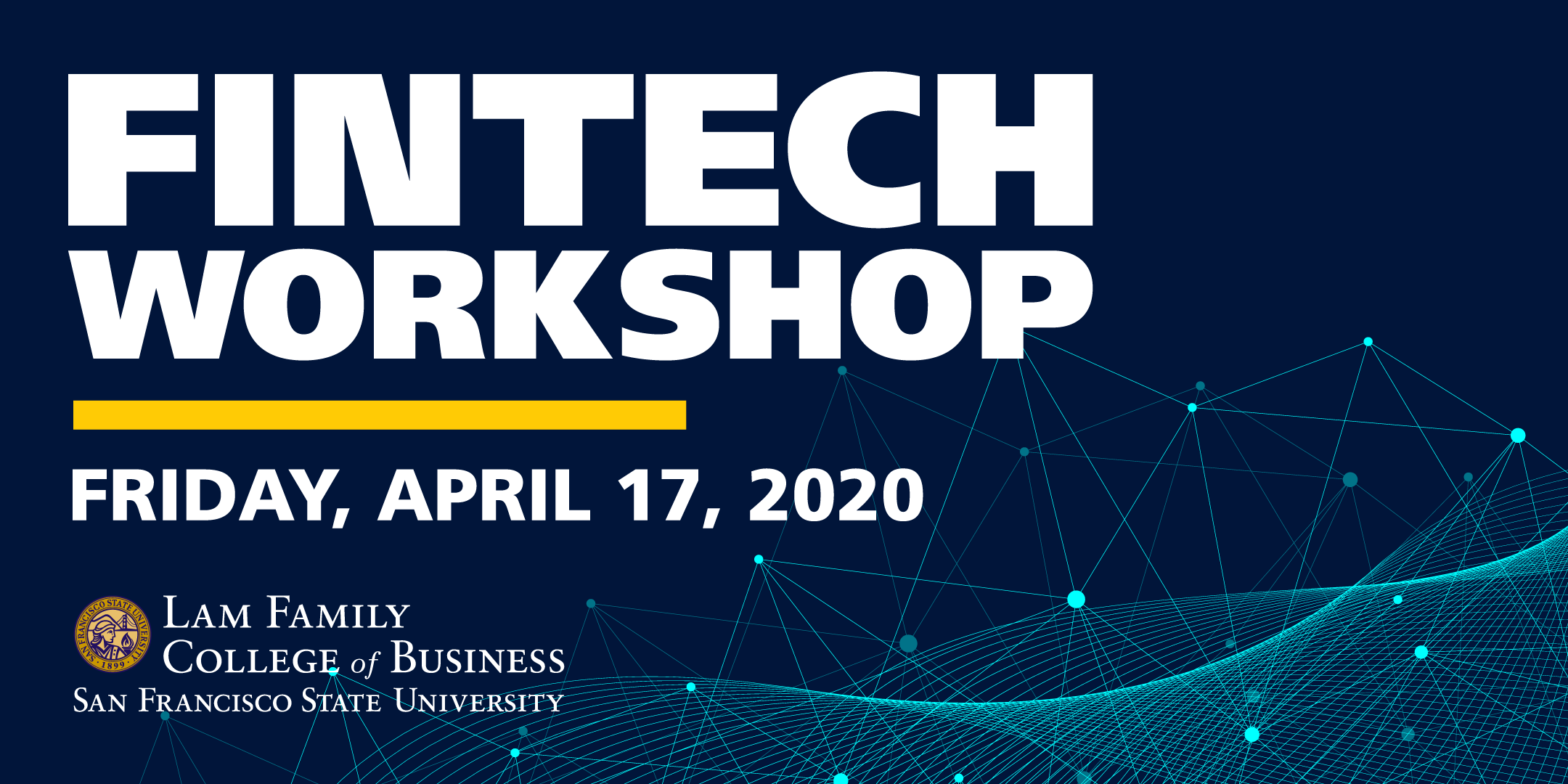
April 17, 2020
The Fintech Workshop at the Lam Family College of Business is open to San Francisco State University students, faculty and alumni.
This event is sponsored by the Technology in Business Education and Financial Technology Initiatives, funded by the Lam-Larsen Global Innovation Fund. This one-day workshop will examine how financial technology (FinTech) and big tech firms are disrupting financial markets. Specifically, these firms are disrupting payment, credit, and potentially government-issued currency. They are providing more convenient and less expensive financial products to a wider range of customers. We will focus on areas where disruption has occurred and will likely occur.
Attendees will be instructed by Sujit “Bob” Chakravorti, a 25-year veteran of the financial industry with central banking, industry and consulting experience. He was a Senior Economist at the Federal Reserve Bank with consulting roles in the IMF and the World Bank. He earned his doctorate in Economics from Brown University.
Event Ticket Price: $15
Workshop Instructor
Sujit “Bob” Chakravorti
Founder, Chakra Advisors
Sujit “Bob” Chakravorti is the Founder and CEO of Chakra Advisors, a strategy and management consulting firm, that advises financial institutions, technology firms, policymakers, and FinTech startups. His vision for Chakra Advisors is to facilitate more efficient and accessible financial services for consumers and businesses.
Two examples of FinTech companies that Bob advises are Digital Mint and Inamo. Digital Mint increases access to electronic payments by making bitcoins accessible to underbanked households to access digital payments. Inamo has developed an information platform that allows for contactless payments, access into buildings and concerts, and potentially storage of government-issued identification for on-the-go consumers wanting to abandon their wallets.
Prior to his current role, Bob was the Chief Economist at The Clearing House (TCH), the operator of the largest U.S. private sector payment system and a trade association for the largest 24 commercial banks operating in the United States. As Chief Economist, he oversaw all quantitative studies and was an advisor on strategic financial market and payments matters facing the banking industry.
Before joining TCH, Bob spent 15 years at the Federal Reserve Banks of Chicago and Dallas as a senior research economist conducting financial market research with an eye toward innovation and policy development. Prior to joining the Federal Reserve System, he worked at KPMG as an international economist advising foreign governments on financial market modernization.
Bob is a frequent speaker at industry and academic forums globally and has been interviewed by major media outlets such as the Financial Times, Wall Street Journal, and American Banker. He has published over 40 articles in academic and industry journals.
In addition, he has been invited as an international financial market expert by the Bank of England, the Bank of Mexico, De Nederlandsche Bank (Dutch central bank), the International Monetary Fund, the European University Institute, and the University of Granada. He serves on the Survey of Consumer Payment Choice Advisory Board at the Federal Reserve Bank of Boston and is an associate editor for the Journal of Financial Market Infrastructures. He was one of the inaugural members of the Consortium for Systemic Risk Analytics housed at the Massachusetts Institute of Technology.
Bob received his PhD in economics from Brown University and his BA in economics and genetics from the University of California-Berkeley.
Preliminary Agenda
Be sure to register prior to the event — You won’t want to miss this informative and transformational workshop!
April 17, 2020
8:30–9:30 a.m. Registration and Breakfast
9:30–10:30 a.m. Preliminaries
- Financial market disruption and pain points for incumbents
- Accessing customers directly with new technologies and access to account data
- Potential impacts on incumbents-partner, acquire, or compete via transformation
10:45–Noon. Payments
- Improving upon current payment solutions in certain niche markets, e.g. peer-to-peer and business to business payments
- Reducing cost and increasing convenience to consumers and businesses through technology
- Establishing partnerships between disruptors and incumbents throughout the technology stack
- Using payments data to improve measuring creditworthiness
Noon–1 p.m. Lunch and Networking
1–2:15 p.m. Lending
- Creating platforms to provide direct access between borrowers and lenders
- Using public and proprietary data to better predict default and extend loans to those that may not have access otherwise
- Reducing costs to incumbents by using more efficient customer acquisition
- Improving underwriting with greater participation of incumbent lenders
2:30–3:45 p.m. Cryptocurrency
- Replacing government-issued currency, is it a real threat?
- Going beyond the illegal use cases
- Using underlying technology of cryptocurrency such as blockchain and smart contracts to improve financial transactions
4–4:30 p.m. Technology and Skills
- Computing technologies such as artificial intelligence and machine learning will improve financial transactions
- Using data analytics to drive greater competition between incumbents and disruptors
- Using technology to improve compliance
4:30–5:15 p.m. Technology and Skills
- Creating sound public policy around data privacy
- Making financial services accessible for more consumers and small businesses
- Determining which types of institutions are regulated and issued licenses to operate as a bank